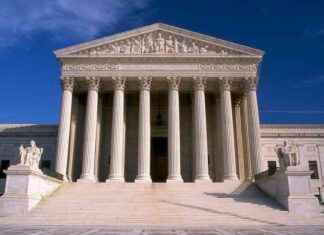Almost 14 million people in Bavaria and Hesse are called to vote for a new state parliament on Sunday. Today the election campaign reaches its climax with numerous closing events in both countries. Shortly before the vote, the incumbents in Wiesbaden and Munich are unchallenged in the lead in surveys.
According to the current ZDF “Political Barometer”, Prime Minister Markus Söder’s CSU gained one percentage point in the “Sunday Question” in a survey published on Thursday evening by the Elections Research Group compared to the previous week and ended up at 37 percent. This would roughly match the result of the 2018 state election (37.2 percent). In Hesse, Prime Minister Boris Rhein’s CDU is at 32 percent, as in the previous week.
There is no doubt that Söder will remain Prime Minister
In Bavaria, based on the polls, there is no doubt that Söder will remain Prime Minister. Five years ago, the CSU fell by more than 10 percentage points to just 37.2 percent – and was therefore once again dependent on a coalition partner. In Hesse, the CDU and SPD also suffered double-digit losses in 2018. According to surveys, the Black-Green Party in Hesse could possibly start a third term in office. In the most recent surveys, however, there is a three-way battle for second place between the Greens, SPD and AfD.
At the end of the Bavarian state election campaign, CSU boss Söder and North Rhine-Westphalia Prime Minister Hendrik Wüst (CDU) sharply criticized the Berlin traffic light government. “We have to send this traffic light into the desert in 2025,” said Söder that evening at the CSU’s official final rally in Munich. But the state elections are also an important turning point. It is important that there is “continuity and stability”. Wüst also demanded: “This rusty government traffic light belongs in the recycling yard.” CDU leader Friedrich Merz addressed the several hundred guests in the Löwenbräukeller via video message. He called for the state election to also be a vote on the federal government’s policies.
Rhine appears combative
Rhein appeared combative before the state elections and swore his supporters to the countdown before the vote. “We don’t want to win a Sunday question, we want to win a state election – and we will fight hard for that in the remaining 48 hours,” he said at an election event in Gießen and, as in previous weeks, criticized the Berlin traffic light coalition and its internal disputes: “Only with We can keep Hesse traffic light-free.”
At an election campaign event in Taunusstein, Hesse, Merz called on the federal government to tackle the announced German pact as soon as possible. There is an urgent need to discuss how irregular migration into the social security systems can be reduced or stopped as quickly as possible.
Klingbeil: Resolve people’s concerns faster
In the opinion of SPD leader Lars Klingbeil, the traffic light government in the federal government must resolve the concerns of the people in the country more quickly in order to stop the AfD from soaring in nationwide surveys. “Yes, we have to do better and solve people’s everyday worries. We’re tackling that now,” he said at the official end of the Bavarian SPD’s election campaign in Munich, also explicitly mentioning the issue of migration. The solidarity distribution system within the European Union is crucial, but there must also be a faster deportation of those who are not allowed to stay in Germany. With regard to the election, Klingbeil emphasized that it was “not about Berlin, the traffic lights or Olaf Scholz.” The CSU and not Berlin is responsible for the fact that the energy transition is not making progress in Bavaria.
Many voters are still undecided
According to the ZDF “Politbarometer”, many voters are still undecided. 28 percent of respondents in Bavaria and 32 percent in Hesse do not yet know who they want to vote for. For the representative survey, 1,209 randomly selected voters in Bavaria and 1,000 in Hesse were interviewed by telephone and online from October 4th to 5th.
Election surveys are generally always subject to uncertainty. Among other things, weakening party ties and increasingly short-term voting decisions make it more difficult for opinion research institutes to weight the data collected. The research group indicates a statistical margin of error of two to three percentage points. In principle, surveys only reflect the opinion at the time of the survey and are not predictions of the election outcome.
Alice Weidel back in the election campaign
After Alice Weidel canceled an election campaign appearance on German Unity Day, the co-party leader of the AfD wants to return to the public stage. The AfD federal office said she plans to be there at the end of the Hessian election campaign at the weekend in Wiesbaden. Weidel had previously canceled a public election campaign meeting in the Bavarian-Thuringian border town of Mödlareuth – according to his own statements, “after indications of a possible imminent attack.”
ZDF-“Politbarometer”










